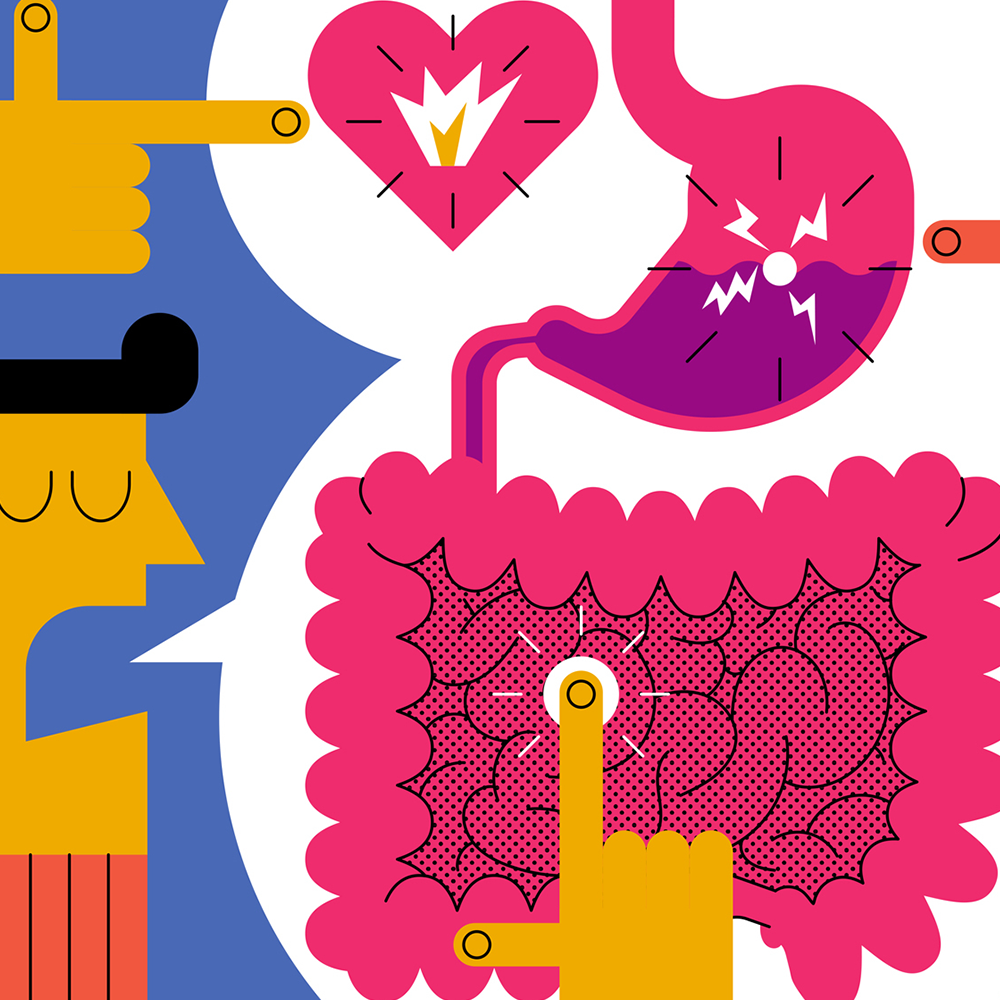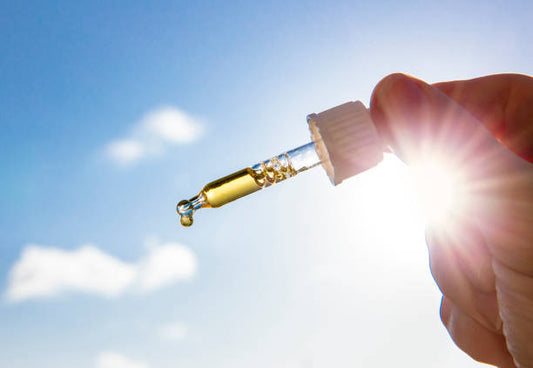Discover Related Products
Now explore supplements designed to support Longevity, Gut Health & Cellular Vitality.
CITOZYM - Support Natural Detox, Immune and Longevity Support
The Influence of Gut Bacteria on Mood: Exploring Molecular and Physiological Mechanisms

Recent research has shed light on the complex interactions between gut microbiota and the central nervous system (CNS), offering new insights into mental health and the treatment of mood disorders. This article explores the molecular and physiological mechanisms through which gut microbiota can influence human mood and behavior.
Composition and Dynamics of Gut Microbiota
The human gut microbiota comprises trillions of microorganisms, including bacteria, archaea, viruses, and fungi, which play a crucial role in maintaining host health. The predominant bacterial phyla include Firmicutes and Bacteroidetes, with notable contributions from Actinobacteria and Proteobacteria (1).
Individual Variations and Influencing Factors
The composition of gut microbiota is influenced by genetic, dietary, environmental, and pharmacological factors. Individual differences in microbial composition can affect susceptibility to mood disorders and other health conditions (2).
The Gut-Brain Axis: A Complex Communication Network
The gut-brain axis is a bidirectional communication network linking the gastrointestinal system and the CNS, integrating neural, immune, and endocrine signals.
Communication Mechanisms
-
Vagus Nerve and Enteric Nervous System (ENS): The vagus nerve is a major communication pathway between the gut and the brain. Stimulation of the vagus nerve by gut bacteria can modulate brain function and influence mood and behavior (3).
-
Production of Neurotransmitters and Metabolites:
-
Serotonin: Gut bacteria can affect serotonin synthesis in the intestine by modulating the metabolism of tryptophan, a serotonin precursor (4).
-
GABA: Certain gut bacteria, such as Lactobacillus and Bifidobacterium, produce gamma-aminobutyric acid (GABA), an inhibitory neurotransmitter that can reduce anxiety and improve mood (5).
-
-
Microbial Metabolites:
-
Short-Chain Fatty Acids (SCFAs): SCFAs like acetate, propionate, and butyrate, produced by the fermentation of dietary fibers, can modulate neuroinflammation and influence neuroplasticity (6).
-
Immune Modulation
- Tryptophan Metabolism: The microbiota influences tryptophan metabolism, leading to the production of indole acids and kynurenine, which can have neuroprotective or neurotoxic effects (7).
- Systemic Inflammation: The microbiota regulates the production of pro-inflammatory and anti-inflammatory cytokines, influencing the systemic immune response. An imbalance favoring inflammation is often linked to depressive disorders (8).
- Blood-Brain Barrier (BBB): The permeability of the BBB can be modulated by bacterial metabolites and cytokines. A healthy microbiota helps maintain the integrity of the BBB, preventing inflammatory molecules from infiltrating the CNS (9).
Clinical Implications and Emerging Therapies
Understanding the mechanisms through which gut microbiota influence mood has led to the development of new therapies for mental disorders.
Probiotics and Psychobiotics
-
Psychobiotics: Specific probiotic strains have been shown to have beneficial effects on mental health. Lactobacillus rhamnosus and Bifidobacterium longum have been linked to reductions in anxiety and depressive symptoms in clinical studies (10).
-
Prebiotics: Prebiotics, which promote the growth of beneficial bacteria, can improve microbiota diversity and have positive effects on mood and behavior (11).
- Therapeutic Potential: FMT has shown potential in treating mood disorders by directly modulating the gut microbiota. Preclinical studies in animal models indicate that FMT can influence emotional behavior (12).
Diet and Lifestyle
- Mediterranean Diet: A diet rich in fiber, polyphenols, and unsaturated fatty acids is associated with a diverse microbiota and improved mental well-being. Fermented foods, such as yogurt and kefir, provide natural probiotics (13).
Tips for Supporting Mental Health Through Gut Microbiota
Emerging scientific evidence suggests that maintaining a healthy gut microbiota can positively impact mental health. Here are some practical tips to promote optimal microbial balance and enhance mental well-being.
1. Adopt a Fiber-Rich Diet
-
Dietary Fiber: Consume a variety of fruits, vegetables, whole grains, and legumes. Dietary fibers act as prebiotics, nourishing beneficial bacteria and promoting the production of short-chain fatty acids (SCFAs), which have anti-inflammatory and neuroprotective effects (6).
-
Foods Rich in Polyphenols: Berries, grapes, green tea, and dark chocolate contain polyphenols, compounds that promote the growth of beneficial bacteria and reduce inflammation (13).
2. Include Fermented Foods in Your Diet
- Natural Probiotics: Regularly consume fermented foods such as yogurt, kefir, sauerkraut, kimchi, and miso. These foods are rich in natural probiotics that can increase gut microbiota diversity and improve mood (10).
3. Consider Probiotic and Prebiotic Supplements
Psychobiotics: Consider supplementation with specific probiotic strains, such as Lactobacillus rhamnosus and Bifidobacterium longum, which have been shown to have beneficial effects on mental health and reduce symptoms of anxiety and depression (10).
Prebiotics: Prebiotic supplements, such as inulin and fructooligosaccharides (FOS), can enhance the growth of beneficial bacteria and positively modulate the gut-brain axis (11).
4. Maintain an Active Lifestyle
Regular Physical Activity: Exercise not only directly improves mental well-being but also positively affects gut microbiota composition. Exercise can increase microbial diversity and promote the production of beneficial metabolites (9).
5. Reduce Stress
Stress Management Techniques: Regularly practice relaxation techniques such as meditation, yoga, and deep breathing. Chronic stress can negatively affect gut microbiota and the gut-brain axis, contributing to mood disorders (8).
6. Avoid Excessive Use of Antibiotics
Responsible Use of Antibiotics: Antibiotics can significantly alter the composition of the gut microbiota. Use antibiotics only when strictly necessary and under medical guidance to minimize negative effects on the microbiota (1).
By following these tips, you can support a healthy gut microbiota, which can contribute to improved mood and overall mental well-being. Incorporating these practices into your daily routine can offer long-lasting benefits for physical and mental health.
Future Directions and Research Challenges
Research on the gut microbiota and its influence on mood is still evolving, with several challenges and future opportunities:
-
Understanding Molecular Mechanisms: While many mechanisms have been identified, the complexity of interactions between microbiota and the CNS requires further study to clarify molecular details.
-
Personalization of Therapies: Individual variability in microbiota composition suggests the need to develop personalized treatments based on individual microbial profiles.
-
Safety and Efficacy of FMT: While FMT shows promise, further research is needed to determine the long-term safety and efficacy of this treatment for mood disorders.
The emerging understanding of the role of gut microbiota in mood regulation represents one of the most promising frontiers in medicine and neuroscience. Current discoveries highlight the potential of the microbiota as a therapeutic target to improve mental well-being and treat mood disorders. With continued research progress, new therapies based on gut microbiota modulation become increasingly realistic, offering hope for more effective and personalized treatments.
References
- Human Microbiome Project Consortium. (2012). Structure, function and diversity of the healthy human microbiome. Nature, 486(7402), 207–214.
- Valles-Colomer, M., Falony, G., Darzi, Y., Tigchelaar, E. F., Wang, J., Tito, R. Y., ... & Raes, J. (2019). The neuroactive potential of the human gut microbiota in quality of life and depression. Nature Microbiology, 4(4), 623-632.
- Breit, S., Kupferberg, A., Rogler, G., & Hasler, G. (2018). Vagus Nerve as Modulator of the Brain–Gut Axis in Psychiatric and Inflammatory Disorders. Frontiers in Psychiatry, 9, 44.
- Mayer, E. A., Knight, R., Mazmanian, S. K., Cryan, J. F., & Tillisch, K. (2014). Gut Microbes and the Brain: Paradigm Shift in Neuroscience. The Journal of Neuroscience, 34(46), 15490-15496.
- Barrett, E., Ross, R. P., O’Toole, P. W., Fitzgerald, G. F., & Stanton, C. (2012). γ- Aminobutyric acid production by culturable bacteria from the human intestine. Journal of Applied Microbiology, 113(2), 411-417.
- Koh, A., De Vadder, F., Kovatcheva-Datchary, P., & Bäckhed, F. (2016). From Dietary Fiber to Host Physiology: Short-Chain Fatty Acids as Key Bacterial Metabolites. Cell, 165(6), 1332-1345.
- Cervenka, I., Agudelo, L. Z., & Ruas, J. L. (2017). Kynurenines: Tryptophan’s metabolites in exercise, inflammation, and mental health. Science, 357(6349), eaaf9794.
- Kelly, J. R., Borre, Y., O'Brien, C., Patterson, E., El Aidy, S., Deane, J., ... & Dinan, T. G. (2016). Transferring the Blues: Depression-Associated Gut Microbiota Induces Neurobehavioural Changes in the Rat. Journal of Psychiatric Research, 82, 109-118.
- Dinan, T. G., & Cryan, J. F. (2017). The Microbiome-Gut-Brain Axis in Health and Disease. Gastroenterology Clinics of North America, 46(1), 77-89.
- Wallace, C. J. K., Milev, R. (2017). The effects of probiotics on depressive symptoms in humans: A systematic review. Annals of General Psychiatry, 16, 14.
- Schmidt, K., Cowen, P. J., Harmer, C. J., Tzortzis, G., Errington, S., & Burnet, P. W. (2015). Prebiotic intake reduces the waking cortisol response and alters emotional bias in healthy volunteers. Psychopharmacology, 232(10), 1793-1801.
- Zheng, P., Zeng, B., Zhou, C., Liu, M., Fang, Z., Xu, X., ... & Xie, P. (2016). Gut microbiome remodeling induces depressive-like behaviors through a pathway mediated by the host’s metabolism. Molecular Psychiatry, 21(6), 786-796.
- Sandhu, K. V., Sherwin, E., Schellekens, H., Stanton, C., Dinan, T. G., & Cryan, J. F. (2017). Feeding the microbiota–gut–brain axis: diet, microbiome, and neuropsychiatry. Translational Research, 179, 223-244.







No comments